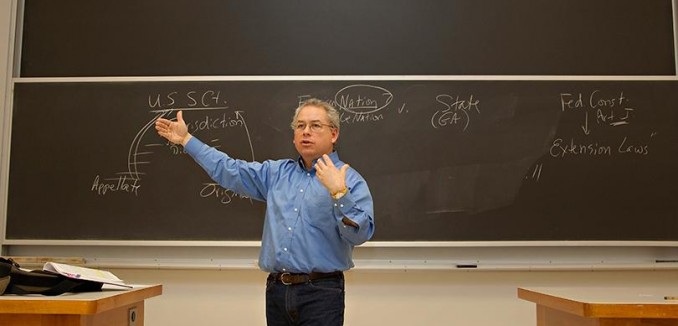The president of Dartmouth College announced in an email to faculty on Monday that a recently appointed dean of faculty has declined the position following widespread outcry over his support for academic boycotts of Israel.
Professor N. Bruce Duthu’s appointment in March came under heavy criticism after it was revealed that he co-authored a 2013 declaration backing boycotts of Israeli universities for the council of the Native American and Indigenous Studies Association (NAISA).
President Phil Hanlon said that Duthu will remain at Dartmouth as a professor of Native American studies.
Explaining his decision in a separate email to Dartmouth faculty and staff on Monday, Duthu wrote:
As many of you know, the news of my appointment, at least in some circles, remains a source of concern and contention. Whether warranted or not, this matter has been and will likely continue to be a significant distraction for me professionally and a source of considerable pain and frustration for me personally.
It also has the great potential to be damaging to the college in the long term, given the higher visibility and engagement with external audiences that come with the dean’s position. Under these circumstances, I do not believe I can serve effectively as your Dean.
Duthu, who was set to assume the position of dean of the faculty of arts and science in July, also stepped down as associate dean of the faculty for international studies and interdisciplinary programs.
The decision to appoint Duthu, an advocate of the Boycott, Divestment, and Sanctions (BDS) campaign against Israel, to a top administrative post raised questions about Dartmouth’s commitment to academic freedom. BDS aims to restrict engagement with Israel, academic and otherwise, until it accedes to a number of unilateral Palestinian demands, and many of its leaders have affirmed that they seek Israel’s destruction. The campaign was rejected by the president of Dartmouth and many other university heads, including former President of Harvard University Lawrence Summers, who warned that academic divestiture and boycott movements singling out Israel were “anti-Semitic in effect if not intent.”
After Duthu’s appointment, Dartmouth Economics Professor Alan Gustman told the Haym Salomon Center that the college seemed to be “perfectly comfortable appointing a dean who is in favor of the anti-Semitic BDS movement and is unaware of or is unconcerned with the contradictory public positions he has taken with regard to his obligations as dean of the faculty.”
“I had hoped that the specter of past anti-Semitism had left Dartmouth. Now, I am not so sure,” Gustman added.
In a faculty-wide email on May 3rd protesting Duthu’s promotion, Gustman further noted:
The chant of the BDS movement, from the river to the sea, is anti-Israel, anti-Zionist, and profoundly anti- Jewish. It refers to sweeping the Jews out of Israel. Where else do we find movements advocating action against the academic institutions in any country but Israel, including many truly bad actors in the world?
BDS is singling out Israel – the one country in the world that has a majority Jewish population. Indeed, this movement has become a cover for many anti-Semites who like nothing better than to once again be free to exercise their prejudices. It also is important to understand, especially when evaluating the significance of appointing a BDS advocate as the Dean of the Faculty, that BDS is not just a statement of beliefs or a philosophical movement: it is a statement of action.
Susan Julien-Levitt, executive director of Alums for Campus Fairness, echoed Gustman’s concerns in a statement to the Haym Salomon Center, observing that BDS smears Israel “as a human rights abuser worthy of pariah status while ignoring the substantial ongoing human rights abuses occurring in Israel’s neighboring countries.”
“Professor Duthu’s apparent belief that academics and academic institutions should be shunned based on the policies of their governments shows a disregard for the fundamental principles of academic freedom,” she added.
Following the controversy over his appointment, Duthu released a statement on May 9th claiming, in direct contradiction of the NAISA declaration he signed and helped draft, that he does “not believe that a boycott of academic institutions is the appropriate response” to a country’s government policies. He also said that he would abide by the decision of the university’s president to reject boycotts of Israeli universities or academic institutions of any kind. He did not specifically disavow BDS.
In a subsequent public letter, Gustman wrote of Duthu, “the only adequate response to his public support for the BDS movement is that he publicly renounce his support for BDS.”
A report published in March by the American Council of Trustees and Alumni warned that the campaign on university campuses to boycott Israel poses a threat to academic freedom. BDS activists are “willing to violate the liberties of faculty and their fellow students to advance their own political agenda,” it noted.
Michael B. Poliakoff, the president of the council, explained that his organization’s research “suggests that the tactics employed by the BDS movement clearly conflict with the principles of academic freedom that enable students and educators alike to engage in open discourse, inquiry, and learning.”
Other recent studies have highlighted the threat that the BDS campaign, operating under the guise of academic freedom, poses to the free speech rights of others. Last September, a study by the Israel On Campus Coalition showed how the BDS movement was changing tactics and focusing more on intimidation as a means of spreading its message. Two months later, a statistical study by the AMCHA Initiative, a watchdog group, found a strong correlation between anti-Israel activity on university campuses and on-campus anti-Semitism.
[Photo: Dartmouth website]




